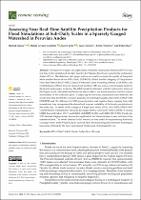Assessing near real-time satellite precipitation products for flood simulations at sub-daily scales in a sparsely gauged watershed in Peruvian andes
Autor(es)
Fecha
2021-02-23Palabras clave
GPM - Andes - Escorrentía - Cuencas - Modelos y Simulación - Inundaciones - Prevención de Inundaciones - GR4HColecciones
- Artículo científico [177]
Recurso(s) relacionado(s)
https://www.mdpi.com/2072-4292/13/4/826Resumen
This study investigates the applicability of Satellite Precipitation Products (SPPs) in near real-time for the simulation of sub-daily runoff in the Vilcanota River basin, located in the southeastern Andes of Peru. The data from rain gauge stations are used to evaluate the quality of Integrated Multi-satellite Retrievals for GPM–Early (IMERG-E), Global Satellite Mapping of Precipitation– Near Real-Time (GSMaP-NRT), Climate Prediction Center Morphing Method (CMORPH), and HydroEstimator (HE) at the pixel-station level; and these SPPs are used as meteorological inputs for the hourly hydrological modeling. The GR4H model is calibrated with the hydrometric station of the longest record, and model simulations are also verified at one station upstream and two stations downstream of the calibration point. Comparing the sub-daily precipitation data observed, the results show that the IMERG-E product generally presents higher quality, followed by GSMaP-NRT, CMORPH, and HE. Although the SPPs present positive and negative biases, ranging from mild to moderate, they do represent the diurnal and seasonal variability of the hourly precipitation in the study area. In terms of the average of Kling-Gupta metric (KGE), the GR4H_GSMaP-NRT’ yielded the best representation of hourly discharges (0.686), followed by GR4H_IMERG-E’ (0.623), GR4H_Ensemble-Mean (0.617) and GR4H_CMORPH’ (0.606), and GR4H_HE’ (0.516). Finally, the SPPs showed a high potential for monitoring floods in the Vilcanota basin in near real-time at the operational level. The results obtained in this research are very useful for implementing flood early warning systems in the Vilcanota basin and will allow the monitoring and short-term hydrological forecasting of floods by the Peruvian National Weather and Hydrological Service.
El ítem tiene asociados los siguientes ficheros de licencia:








